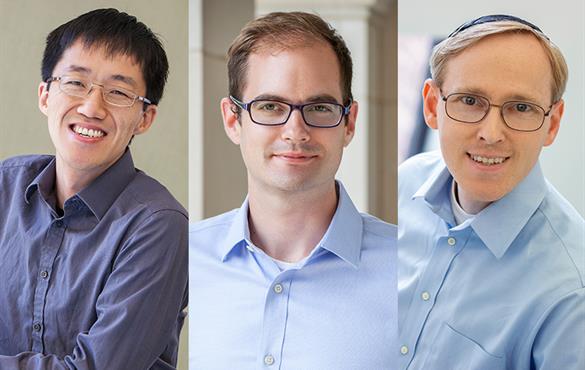Three McKelvey Engineering faculty working on prestigious MURI collaborations
Matthew Lew, Elijah Thimsen and Yevgeniy Vorobeychik are each on research teams that received one of 24 MURI projects for the Department of Defense

Three faculty in the McKelvey School of Engineering at Washington University in St. Louis are participating in the U.S. Department of Defense's highly competitive Multidisciplinary University Research Initiative Program (MURI) on projects that may benefit the U.S. military.
Matthew Lew, assistant professor of electrical & systems engineering; Elijah Thimsen, assistant professor of energy, environmental & chemical engineering; and Yevgeniy Vorobeychik, associate professor of computer science & engineering, are each on teams that received one of 24 MURI awards totaling $169 million. The research teams include more than one traditional science and engineering discipline to speed the research process.
Lew is working with a team developing a new class of functional living electronics, which they call livtronics, in which they will determine whether there is a way to engineer and assemble electronic systems based on living materials, such as proteins and bacteria instead of traditional materials, such as silicon. Lew's role is to use fluorescence imaging technology to visualize how electrons are transported through living systems either within the bacterial cell or between bacterial cells in the biofilm. The total project received $7.5 million over five years.
Thimsen is working with a research team investigating how to use dusty plasma, or plasma in which particles are suspended, to make new materials. They will study how to build on what is known about making powders to determine how to make solids, such as ultra-hard and tough ceramics, such as cubic boron nitride. To create the material, researchers are using a low-temperature plasma, which is a highly nonequilibrium environment that can provide access to unique and potentially useful states of matter. The five-year project received $6.4 million.
Vorobeychik is working with a team developing tools to understand and shape online and on-the-ground networks that drive human decision making. It will focus on areas such as international diplomacy, street crime, terrorism, military strategy, financial markets and industrial supply chains. The team is using game theory, which is a mathematical way of modeling how different players interact when their interests are potentially in conflict. These players can be organizations, people or computers. The project will apply multi-scale network modeling to the data created by electronic recordkeeping — social media posts, crime statistics, demographic trends and other sources. The five-year project received $6.25 million.
Click on the topics below for more stories in those areas
- Brief
- Research
- Energy, Environmental & Chemical Engineering
- Electrical & Systems Engineering
- Computer Science & Engineering






